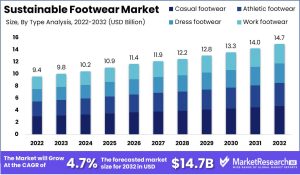Sustainable Footwear Industry size is expected to be worth around USD 14.7 Bn by 2032 from USD 9.4 Bn in 2022, growing at a CAGR of 4.7% during the forecast period from 2023 to 2032.

Overview of Sustainable Footwear:
Sustainable footwear refers to shoes designed, produced and consumed with an eye towards minimizing negative environmental and social impacts throughout their entire lifecycle, from material sourcing and production through distribution, usage and end-of-life disposal. As consumer awareness about environmental issues has grown exponentially, demand for sustainable footwear has skyrocketed – prompting manufacturers, designers and brands to adopt creative ways of producing footwear with reduced carbon footprint, eco-friendly materials, fair labor practices support.
Key Market Segments
By Type Analysis
- Casual footwear
- Athletic footwear
- Dress footwear
- Work footwear
By End-use Analysis
- Women
- Men
- Children
Driving Factors:
Rising environmental concerns combined with an emphasis on ethical consumption is one of the major forces driving the sustainable footwear movement. Consumers increasingly look for alternatives to conventional shoes which often depend on non-renewable resources, hazardous chemicals and exploitative labor practices; in response, both activists and consumers seek greater transparency and accountability within this industry.